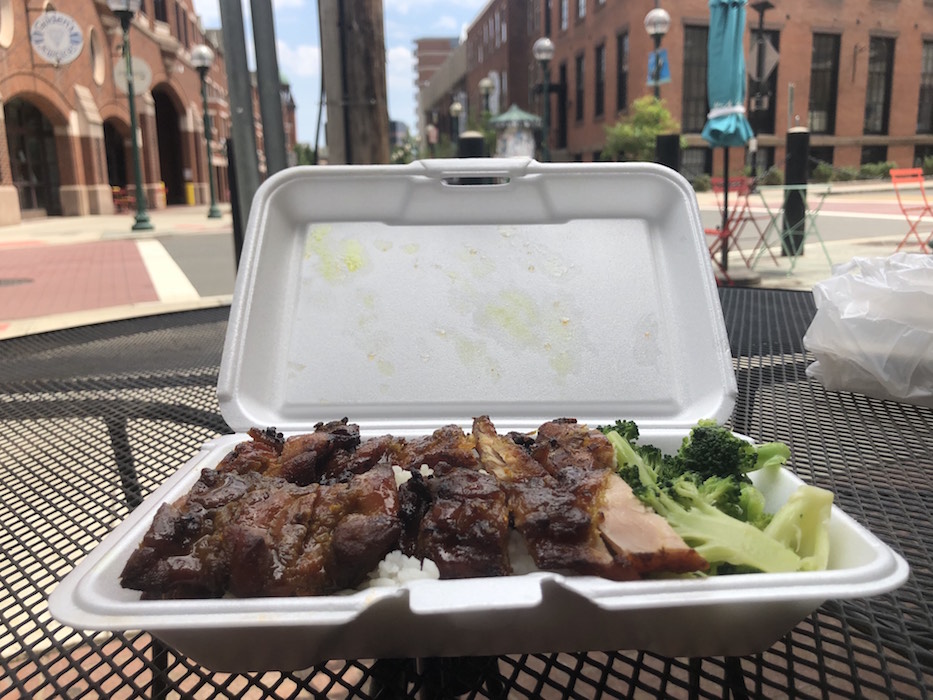Standing side by side, Wancsai Bunbanlu expertly sliced one slab of chicken, then another, as his wife Gornjada Tienjai filled a takeout container with steaming rice and broccoli. He handed them off to her, and she brought them to the window before asking the customary, “sauce?”
Husband and wife duo Bunbanlu and Tienjai have been serving New Haven from inside Jasmine Thai Cart for 15 years. On March 18, when the city ordered food trucks to close, they left their familiar spot on Church Street in order to slow the spread of COVID-19.
Now, four months later, they’re back. The two are parked once more at 250 Church St., outside the Yale Student Receiving Center that sits just before the intersection of Church Street and Wall Street.
Jasmine is different from the other Thai restaurants in New Haven, said Bunbanlu in a recent phone call. His blend of spices and herbs is unique to his cart.
“We try to do the best for the customers,” he said. “A lot of customers come to me and say, ‘I go to restaurants, and the grilled chicken and pineapple fried rice is different—it’s different from your cart.’”
The pair work hard for Jasmine’s signature flavors. Cooking begins at 6:30 a.m. for Bunbanlu. He’s dedicated to serving fresh food to his customers, and he does it well. Perhaps it’s risky to prepare the food beforehand, he said. But cooking orders as they come in takes longer, and once he sells all his food his day is finished that much more quickly.
Their workday doesn’t just end at 3 p.m., when the cart closes down. After leaving their spot on Church Street, Bunbanlu and Tienjai spend the rest of the afternoon preparing for the next day. There’s a truck to clean, ingredients to be bought, and chicken to marinate.

During the shutdown in March, the two weren’t left with many options. They managed to secure a Payment Protection Program (PPP) loan, said Bunbanlu, but it wasn’t much. The only thing left to do, he said, was clean the truck. While some may have seen the stay-at-home orders as a much needed break, Bunbanlu said Saturdays and Sundays were enough for him—all he wanted was to be back out doing business.
Four weeks ago, Tienjai and Bunbanlu donned masks and returned to the streets. Nestled in their truck, they now have signs posted on the exterior reminding customers to socially distance, wear masks, and educate themselves about COVID-19. A bottle of hand sanitizer adorns the front of the truck, perched on the shelf just under the menu.
The switch to socially distant business models is easier for food trucks than for most.
“In restaurants you can go in, but not like before.” said Bunbanlu about Covid-19 guidelines. “But for me, I’m outside. I’m on the street. It’s just the way COVID rules and regulations say. It’s takeout. It was always takeout.”
Though they managed to stay afloat during the months when food trucks were still not allowed out, there is still another challenge—getting customers. Nearby, office buildings are still either closed or partially open to a limited amount of workers a day. On a recent Friday, Bunbanlu estimated he was only making about 40 percent of what he usually would.
Even so, things are still looking up for the truck. With the partial reopening of City Hall this month, he expects business to start getting back on track soon.
The city has also been working to help food trucks get through the pandemic. Deputy Economic Development Director Steven Fontana said the initial concern was ensuring the safety of both the food truck owners and their customers.
“We appreciate how much these small business owners mean to New Haven, but we wanted to make sure people were as safe as possible.” he said. As a result, the city took a slow approach to bringing food trucks back in order to avoid creating any unnecessary risks.
“We are focused on doing whatever we can to help small businesses in general and food trucks in particular to survive and thrive, so we’re just very glad that they’re hanging in there.” he said. “We want to help as many of them as possible get through this.”
Additionally, the Economic Development Administration sends a daily e-blast to the thousands of business owners in New Haven. The emails share the latest information about government loans, local grant opportunities, and webinars for businesses. For help with specific matters, individuals are directed to the Connecticut Small Business Development Center (CTSBDC).
“We just want to be the best resource that we can to small businesses,” he said. “We understand how challenging it is right now.”
This piece comes to the Arts Paper through the third annual Youth Arts Journalism Initiative (YAJI), a program of the Arts Council of Greater New Haven. This year, YAJI has gone virtual. Read more about the program here or by checking out the"YAJI" tag.